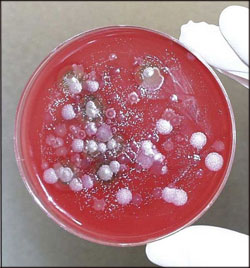 |
Image:P Paul Keim, linkurl:CDC EID,;http://www.cdc.gov/ncidod/EID/vol10no1/03-0238.htm via Wikipedia |
**__Related stories:__***linkurl:Pathogen labs lack security: GAO;http://www.the-scientist.com/blog/display/55093/
[16th October 2008]*linkurl:Biosafety lapses prompt govt review;http://www.the-scientist.com/news/display/53626/
[25th September 2007]*linkurl:The biosafety mess;http://www.the-scientist.com/article/display/15209/
[31th January 2005]

















